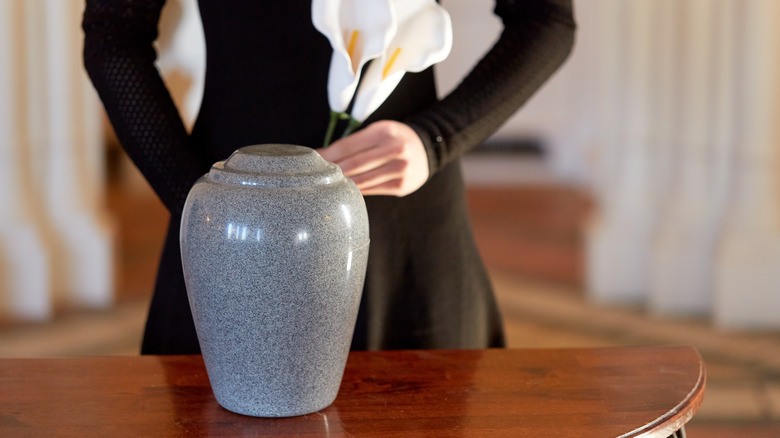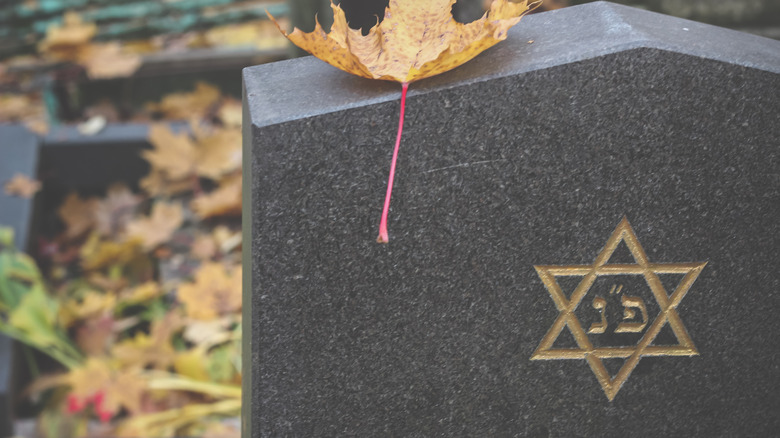Here's What The Bible Says About Cremation
Humans have been burning the bodies of the dead for thousands of years, although when the practice specifically began is difficult to say. As Britannica reports, the practice was introduced in the West (which is to say, Europe and the Mediterranean region) around 1,000 BCE, roughly in line with the time period of the historical narrative of portions of the Old Testament. Specifically, the Ancient Greeks introduced the practice, as, when it comes to war and conquest, burning the bodies of the dead — and bringing their ashes back home to their families — served multiple purposes, not the least of which was clearing the battlefield of rotting corpses quickly and efficiently.
However, on the subject of the Old Testament and the disposal of the bodies of the dead, some readers may wonder if the Bible (either Testament) mentions cremation and, if so, what it says about it. In fact, the ancient text devotes some passages to what happens to a body after death, but it's rather thin on the topic of cremation.
The Bible only mentions cremation directly once, and indirectly a handful of times
Throughout the Bible, when the narrative refers to what happened to a body after the death of its occupant, the person is almost always buried (or, in some cases, placed into a tomb carved out of the rock, as was the case with Jesus). As Christianity.com notes, that was in keeping with the custom and culture of Palestinian Jews of the time.
Indeed, cremation is mentioned directly only once in the Bible, in 1 Samuel 31, where the narrative describes the bodies of Saul and his sons being burned, their bones being buried under a tree. Three other references mention criminals being "burned with fire," as a means of carrying out capital punishment against the lawbreaker. By comparison, the Old and New Testaments together contain around 200 references to burial, entombment, and the like. And indeed, one rather important narrative in the New Testament involves Jesus' friends going to his tomb to tend to his body, and finding it empty (Luke 24).
Cremation and Christianity
So does the Bible's near silence on cremation mean that Christians should embrace (or eschew) the practice? As is often the case with these doctrinal matters, that depends on whom you ask.
As Cremation Resources notes, some Christians believe that their physical bodies will be resurrected from the dead at some point in the future, and as such, require an intact (not cremated) body. However, the article's writer notes that this argument falls apart when you consider that the body decays naturally when it's buried in the ground.
Theologian John MacAurthur, via Christianity.com, says plainly, "The Scriptures do not say anything about required modes of burial for believers," seemingly leaving open the possibility that a Christian could be cremated.
However, in the same Christianity.com article, writer Heather Riggleman notes that, for her, cremation isn't an option. "I am not keen on it. I am not saying there is firm biblical teaching against it, but [I do have a number of] reasons why I [prefer burial]," she wrote.
Cremation and Judaism
So if Christians are pretty much left to themselves to decide if cremation is right for them (pending their personal doctrinal traditions), what about Jews? After all, the Bible (or at least, a decent chunk of it) isn't just for Christians.
As it turns out, Judaism mostly does not treat the matter of cremation with the same degree of ambiguity that Christendom largely does.
Cremation company Neptune Society notes that, for thousands of years, Jewish tradition held that the only acceptable means of disposing of a body was burial in the ground, for a variety of reasons. Perhaps most importantly, cremation was seen as a pagan practice and, as such, one that Jews should avoid as they sought to remove themselves from those types of funerary procedures. Also, cremation does not fulfill the Jewish religious obligation of burial. More recently, the painful memories of the Holocaust and the way the Nazis disposed of the bodies of Jews create a negative association with cremation in the minds of some modern Jews.
In My Jewish Learning, the writer notes that, for most Orthodox and Conservative Jews, cremation remains a no-go, while Reform (viz, more liberal) Jews don't believe that it's necessarily sinful, but that it should be discouraged. In some cases, Orthodox and Conservative rabbis may even discourage families from going ahead and fulfilling the deceased's wishes that they be cremated, as they feel the person will understand the need for a traditional burial once they have departed.



